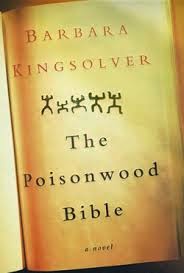Book Review: The Poisonwood Bible
"There's Christian, and then there's Christian."
Another big break between posts. I am still trying to get into the groove of my new life. I have decided that I need activities and things outside of the home. So, that is my current effort. As such, the smaller things have been falling by the wayside. However, I think I am starting to establish my new groove. So, it shouldn't be much longer before I am back to my normal self. I also got a new computer, and I am getting used to this keyboard. Particularly because the space bar is a little bit different in sensitivity than I am used to. You have to hit it much harder than any other one I've ever had, and you have to hit it closer to the middle than I am used to. At times, I wonder if it's because typing isn't something people do as much. We spend so much time just writing things in 140 characters or less. We don't even know how to write in more than that.
But, I finished another book. So, that's where we're at right now.
In The Poisonwood Bible, Baptist, evangelical preacher, Nathan Price, takes his family to a mission in the Belgian Congo in 1959. However, with political upheaval, and the changing lives of three teenage daughters, perhaps they don't rub off on Africa as much as Africa rubs off on them.
One of the daughters, Adah, has an obsession with palindromes. I think that Adah might like the way I like this book. It was very palindromic. When I first started it was slow and hard to get into. I felt like it was trying to be artistic, but was merely a long expanse of mixed metaphors, barely artistic symbols and distracted story. Then, as it started to come together, I found that it went from trying to be artistic, to truly artistic. The metaphors and symbols started to come together. The meanings of things that were previously "What's that supposed to be?" fell together to make sense. I loved it. Then, they should have ended it. But instead, they spent about 150 more pages, trying to flesh out themes that had already been hit home by the rest of the story. It really felt like beating a dead horse. If you hadn't gotten that part of the book yet, you probably weren't going to. It kind of felt like the end of Lord of the Rings. We get it. Let's go home now and think about it ourselves!
One thing I really liked was the contrast of Reverend Price, and a previous missionary in the village of Kilanga, Brother Fowles. Reverend Price came in there with the assumption that he was right about everything, and they were a bunch of lost heathens, and that he would rescue them from their weak-mindedness. It didn't work so well. Brother Fowles learned to know the people, love the people, respect the values that they already had and add to them. Reverend Price took it upon himself to abolish polygamy in Kilanga. Brother Fowles realized that this was a deepset tradition that was necessary to their current survival. And so, instead, he just focused on making sure that each wife was treated humanely. Reverend Price refused to listen to their "demon" superstitions or folklore. Brother Fowles learned their folklore and then taught them the Christian principles already in their folklore. Reverend Price believed them to be idiots because they didn't learn like Americans did. Brother Fowles realized that they learned through stories--perfect for parables. Reverend Price criticized their paganism. Brother Fowles realized that their beliefs in spirits and respect for the Earth wasn't too far from Christianity anyways. And in return, Brother Fowles got more change towards the new parts of Christianity by loving and embracing what they already had.
I thought there were some inconsistencies in the logic (saying that the Congolese had different moral system, and thus it wasn't wrong, but the American moral system? wrong), but I generally enjoyed the book. I just wish it would have known when to quit.
Three stars+. It would have been a high four without the last 150 pages.



Comments